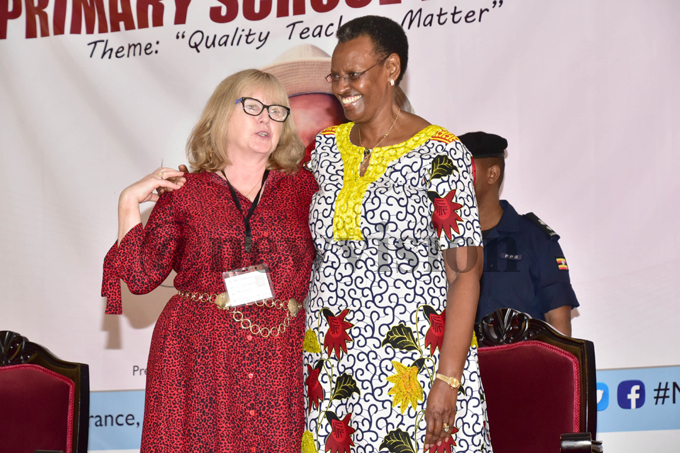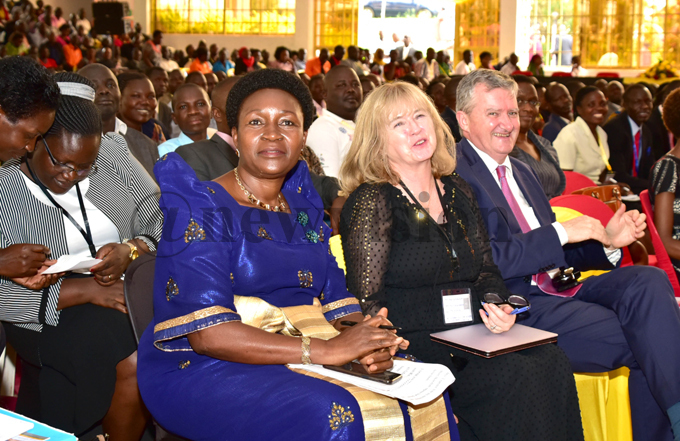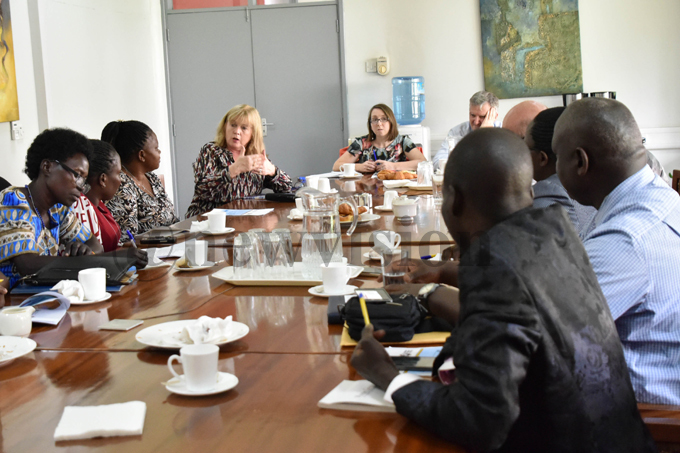Increase teacher training to four years, says Irish education expert
Sep 25, 2019
Education is the single most important transformer of societies, because without education we will not progress economically, and we will not improve the quality of life.

Professor Emer Ring, the Dean of Early Childhood and Teacher Education at Mary Immaculate College in Ireland; a teacher training guru and experienced researcher was in Uganda last week courtesy of the Embassy of Ireland in Uganda; to talk to thousands of teachers who were attending the second National Primary Teachers Conference (NPTC) at the London College of St. Lawrence. Geoffrey Mutegeki, had a chat with her, and she strongly advises on teacher training, inclusive education and best way to discipline pupils.
Professor thanks for coming to Uganda to equip our teachers. What has been your experience for the days you have been here?
I was so excited to be here and my stay has been fantastic. I have met very interesting and lovely people. The teachers and all the people are great to share moments with.
Tell us how Ireland has managed to get to where she is in terms of education and how Uganda can do it?
Looking at your history and our history-they are very similar. We were also occupied by Britain for over 800 years and we got independence in 1922. At the very start of our independence, we were looking at ways to try and get back our own identity and education.

Professor Emer Ring shares a light moment with the First Lady and Minister of Education and Sport, Janet Museveni
We were convinced that education was the only way to transform our country; to make it a place where children could flourish, the family could flourish, and where we could have just and equitable society.
Very similarly here in Uganda, you are the beginning of this journey. Of course, I know in terms of the population and scale of what you have to do it, Uganda is significantly bigger than Ireland but the principles are the same.
Education is the single most important transformer of societies, because without education we will not progress economically, and we will not improve the quality of life.
During your presentation to the teachers, you spoke a lot about Inclusive education? How best do you think Uganda can provide inclusive education?
In Ireland, we have heard a long journey with inclusive education. I think the start of the journey came with the understanding that not all children are the same. Even without having an additional need, all children learn differently.
Research tells us that every single child learns differently. It is the responsibility of each educator to support the learning for each child. We had to start using a different language. Traditionally we made children feel very excluded by using a language like disorder, disability, impairment, retarded, and so on. These words are negative.

Professor Ring and the State Minister for Primary Education Rosemary Sseninde attend the National Primary Teachers Conference at St. Lawrence London College Maya
Instead, we have to start thinking about all children; since they are all different. It is the responsibility of our society to ensure that all children are included in education because all the children have a right to education no matter what their needs are.
I know your Government is very committed to education because during the conference I heard the President (Yoweri Museveni) and the First Lady (and education minister Janet Kataaha Museveni) speak, and they expressed their commitment to education.
What should be done to bring to speed teachers on inclusive education?
We have to ensure that initial teacher education where our teachers are learning to be teachers, they are taught how to include all children. There are many strategies and there is research which can help teachers include children through universal approach to learning.
We need to ensure that teachers have a continuous professional development programme.
As a teacher trainer, what should be done to ensure we have quality teachers?
Teaching is very complicated, and I believe teachers should be paid the most in every society because of the work they do. In Irish society, teachers have the most important job in society and sometimes we forget that and think it easy to be a teacher. It is not so easy.
I know here in Uganda you have very big numbers in your classes. At the time we had independence, our classes were also very big. There needs to be a commitment to reduce class sizes. In Ireland, at the moment it is up to 30 children in the classroom.
On top of all the teacher education, we need to think about, how we can reduce the class size. I understand that it is about money and resources in Uganda, as it was at the time we had independence in Ireland. But we must pay attention to what matters most to use, as a country; and in this case- Uganda.
There is always not enough money, it is a question about how we prioritize the values of our society. Do we believe that all our children have a right to education? Up to 30 years ago Irish children with additional needs were not in school but at home, but lawyers went to court and challenged this because our Constitution says all children have a right to education.

Professor Ring in a meeting with other educationists
It is not perfect in Ireland; we have to continue to make the case for our children, to ensure they are all included in education. The government in Ireland is investing in initial teacher education and to be a primary school teacher, you have to study for four years. We also have a Teachers' Council.
In some schools in Uganda, we still have corporal punishment. How does this affect learning, in your view?
We have to think about corporal punishment. If we think about children, we know from research that children flourish in an environment where they feel safe, secure, where they feel valued and where they are not afraid.
Children need to be in an environment where they are respected and where they have a voice, where they are listened to and where they are supported. So we have to ask ourselves- Are we creating the environment in the classroom that favors this? How we interact is the most important thing in children's development, because interactions drive development.
In Ireland, similarly up to 1980s we had corporal punishment in schools, and at that time we began to think about what impact this had on the children. We realized, based on research that corporal punishment just deters children from learning properly and on this basis, we banned it.
Think about it; If we are scared, we cannot learn. We all run from fearful situations but we expect children to sit in the classroom and learn under the burden of corporal punishment.
We need children to be living in a safe environment where they are not fearful of learning or even failing.
We have to understand that failure is a good thing. Think of all scientists, all people who have wonderful innovations, they failed first. You have to fail, try again, fail and don't be afraid to fail and as human beings, we fail every day and it is the same with children.
There are lots of schools which offer less or no playtime to children. But some teachers say playtime is important. Why is play important?
Play is the work of children. Play is critical to children's learning and development. We have a lot of research telling us that play is really important for children's development; since, during this process, they are motivated and interested. We know if we are motivated and interested in things we will want to do them. Play develops their curiosity; it develops exploration, creativity, imagination, and language.
Sometimes we forget that learning must be fun. Learning is effortful but as educators, we need to make it fun.
I understand in Ireland, primary teachers go for fours before they can qualify to be teachers, what ideal period should Ugandan teachers spend college?
I think in Ireland it was originally two years at the foundation of the state, and then it went to three years, now it is four years.
So if I have to advise, I would suggest that you go to three years first. Take it in steps and then see how that is working. I think two years is short because educating children for the 21st century is too complicated.
We are sending children to a future we don't know. There rapid changing of technology. Every day we are thinking of the skills they need for the 21's century.
There is a link between the quality of teachers and children achievements. And if we are not allowing teachers to engage and to have an in-depth initial teacher education programme, we will have problems.
It is not all about initial teacher education. But we must also pay attention to continuous teacher development.
I spoke to many teachers at the conference and you have a true wealth of seriously committed and enthusiastic teachers who want to be the best they can be. That is why you are doing in the newspapers, to highlight the quality teachers. This is very powerful and an innovative way of making sure that we don't forget that teachers are at the heart of the nation.
Early learning centers are expensive in this country since they are all in the hands of private investors. Are there lessons we can pick from Ireland?
In Ireland pre-primary is in Early Learning was in the past in the hands of most of the private investors, the way it is in Uganda. Parents had to pay for these themselves, except in areas where there was a social-economic disadvantage.
However, in 2010, the government introduced the free pre-school year, and recently they have added a second free pre-school year. So all children in Ireland can have two free pre-school years before going to primary schools. Private Early Learning centers also exist.
If there is more that needs to be worked on in Ireland, it is the pre-school level of education; which had been neglected for years.
So, Uganda can do it our way, if they chose to. They need to do it in phases, since it would be expensive for your government to take it on, at once for all the years of pre-school, for the children.
I think using the existing system but subsidizing it for all the children may be the best way.
You have a lot of work to do at primary so taking on the whole system is not easy.
If we believe that the quality of teachers impacts on the children's achievement, we have to invest in pre-primary education and that is where we are in Ireland, a reason we are doing well in primary education.
Do you think rewarding teachers is important?
Our quality control is slightly different. We have a robust inspection. The reason we don't have awards is that we have trained our teachers well, they are well remunerated and they core in their service delivered; and there is less need to inspire them through rewards.
I know you have a problem here with absenteeism and in Ireland that is unheard of. We have a good management structure in schools, and teachers are well supported to execute their duties.
I think if we were at one time, where you are now as a country. The recognizing and awarding of teachers is good because it highlights the importance of education; until you get to a point where you have almost intrinsic teacher quality systems.
I'm not saying we don't have problems in Ireland. We are not perfect, but because of our entire journey; we have gone past this level. We started our journey before you. We are now at a place where the teacher's union is very strong, we have a robust Teachers' Council, also have an effective inspectorate.
But we have an annual celebration of teachers' work called FÉILTE, which is the Teaching Council's annual Festival of Education in Learning and Teaching Excellence. It celebrates the wonderful work that teachers do every day in their classrooms and allows teachers to collaborate and share their experiences.
I think you should keep doing those awards for some time, till reach that moment. There will come a time when you will have a Teachers' Council and when you will have a very strong initial teacher education programme and a well-developed continuous teacher development programme. At this point, there will be no need for awards, since every teacher will be intrinsically inspired.
